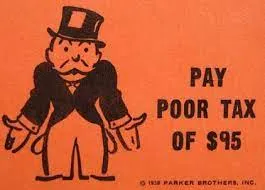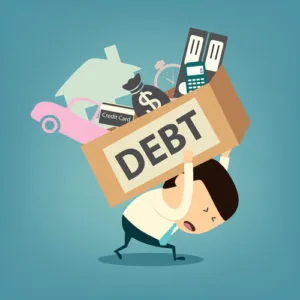Should you declare bankruptcy?
What are the advantages?
What about the disadvantages?
Surprisingly, most people don't know.
Even those who are drowning in debt.
I haven't really thought about bankruptcy for a while until I walked into the room during this episode of Last Week Tonight a few months back. For those of you are unfamiliar with the show I guess I might describe it as left-wing propaganda laced with comedy on HBO. However, while some of the conclusions drawn might not be so great, the problems are usually posed pretty accurately, so I've found useful information can indeed be derived from the show when viewed under the lens of a skeptic.
https://www.moneyunder30.com/when-you-need-to-file-bankruptcy
After watching I decided to brush up on some of the facts with this supplemental information. Here are some rules I've derived for bankruptcy that everyone should know (if only to inform others who may need some good not not financial advice.
Rule #1: Bankruptcy is ironically expensive.
Yup! Lawyers are expensive. Shocker I know.
Apparently some law passed in 2005 made it way more expensive to declare bankruptcy. The paperwork/regulations essentially doubled. You can always try to file all the paperwork yourself (only 90 pages long) but if you mess up the consequences are not so fun. Essentially doing it yourself and avoiding the litigation costs is not really worth it or even a viable option in the vast majority of cases. It costs thousands of dollars to declare bankruptcy.
Rule #2: There are two kinds of bankruptcy.
- Chapter 7 This is what we typically think of when we think "bankruptcy". Debts are essentially forgiven and our credit scores take a big hit for a certain period of time. Ironically credit card companies will offer people who have just declared bankruptcy with a line of credit because they know the person no longer owes anyone any money, and they can get away with offering abysmal APR rates, knowing full well it's a risky play, but worth it on the average.
- Chapter 13 This is more of a restructuring of debt rather than eliminating it entirely. This allows payments to be modified so that citizens can keep up with things like mortgage and car payments. It costs more but there is no money required upfront (whereas chapter 7 require all fees to be paid immediately). This creates some pretty messed up situations because sometimes lawyers will push chapter 13 on individuals using the marketing tactic that it has no down payment, even if chapter 13 doesn't make sense for their particular situation.
Chapter 7 bankruptcy
Otherwise known as “liquidation bankruptcy,” Chapter 7 is designed for individuals with no way to pay their bills otherwise. This type of bankruptcy pays off as much of your unsecured debt as possible, including credit card debt and medical bills. The court “liquidates” your assets by converting them into cash to pay off your creditors.
Chapter 13 bankruptcy
Also known as “reorganization bankruptcy” or “wage earner’s bankruptcy,” Chapter 13 is designed for people who have a consistent income and who want to keep their property. Chapter 13 bankruptcy gives filers a “grace period” of between three to five years to make payments on their debts. Any debts that remain at the end of the grace period are discharged.
Fun story:
If you miss a single payment during Chapter 13 timelines (3-5 years) you're totally fucked and have to start back over at square one. You're creditors also have the option to liquidate your assets at this point.
Rule #3: Student loans can't be forgiven.
Yep, just when you thought you were going to escape student debt, turns out bankruptcy won't get you out of most contracts signed with the government. I could probably write an entire post on this topic alone but, I'll leave that for never. Have fun being poor.
Here are the debts bankruptcy will NOT erase:
- Student loans, whether public or private. You can get relief from student loan payments, but that’s a separate process
- Income taxes you owe. There are payment options for back taxes. Just like student loans, though, income tax payments have a process all their own
- Child support and alimony
- Court fines or other legal penalties (such as traffic tickets)
- Debts to government agencies
- Debts for personal injury or death caused by drunk driving
- Any debts you forget to list in bankruptcy papers

Rule #4: Taking courses on fiscal responsibility.
In many cases people trying to declare bankruptcy are required by law to take a bullshit class about being more fiscally responsible. On the Last Week Tonight episode, a lady was interviewed who was rightfully highly offended by the entire process.
This particular woman was bankrupted by hospital bills due to her child having cancer or something along those lines, and she was forced to sit through a ridiculous government run seminar about how to not spend money on expensive clothes and stuff like that. She was basically vibing like, "Sorry, I guess next time I should try to avoid having my child die slowly and painfully. My bad."
It's been shown that the required seminar is about 0% effective even when it applies to the people it targets. And yet it hasn't been removed. It's basically just a punishment for those who are already down on their luck. Yet another poor person tax (psychologically/time wise).
Rule #5: Don't declare bankruptcy.
So after all this "extensive research" on bankruptcy: I've come to the obvious conclusion. Don't do it! Declaring bankruptcy isn't worth it the vast majority of the time. There are lots of other ways to restructure debt or come to arrangements with creditors that cost very little or nothing at all.
Bankruptcy is a legal procedure, so it should only be employed in the event that we need to perform legalese gymnastics. I've come to the conclusion that if you aren't being sued by your creditors you probably don't need to declare bankruptcy. If you are being sued and declaring bankruptcy is cheaper than going to court (likely) and losing (even more likely), you should probably declare it to sidestep the lawsuit.
Another example would be someone who doesn't want their assets (house/car) to be repossessed and liquidated. By declaring Chapter 13 users can potentially avoid losing their property to the entities they owe money (just don't miss a payment). You can't accomplish this with Chapter 7 because Chapter 7 automatically liquidates all your assets before the remaining debt is forgiven.

Holy crap... crypto though!
Now that I think about it there will likely be some crazy things that happen with crypto in this regard. Imagine someone loading up on a ton of debt, throwing it all into crypto, and then claiming they lost all the money through gambling or a hack or whatever. When their creditors sue them they declare chapter 7 bankruptcy and the court can't liquidate any of the crypto because they don't even know if it exists or not. That would be pretty insane. I bet this has actually already happened dozens of times and no one has been caught yet (or it was never reported widely). Food for thought.
My experience with crippling debt?
Back in the day I was living off of credit cards and wracked up way more debt than I could pay back. What did I do? I just didn't pay it back. Did I declare bankruptcy? Didn't have to. Once credit card debt gets sold to collections (pennies on the dollar at auction) you can no longer be sued for it.
Now over four years later my credit score is back in the "good" range because all that bad debt has dropped off my record. I certainly wouldn't recommend doing this on purpose but in my case it worked out just fine. I borrowed a lot of money, never paid it back, and everything is already back to normal.

Again, bankruptcy is often only needed when you're being sued, and this doesn't happen very often because suing someone is expensive (especially if it's only for a couple thousand dollars here and there across multiple sources). More often than not creditors will just cut their losses and sell the debt to collectors. That way they don't have to pump even more money trying to reclaim debt that they might not get back anyway.
Conclusion
It's pretty messed up, because I know multiple people who have declared bankruptcy, and after the research I've done here I'm left wondering if that was even the right move for them. I don't remember them being in any legal trouble or at risk of losing valuable collateral.
Unfortunately, it seems like we can't even necessarily trust bankruptcy lawyers to be straight with us to give us proper advice. After all, their salary depends on people declaring bankruptcy, so there's a major conflict of interest there when it comes to picking the correct option considering the individual's specific situation.
While you personally may never need to think about declaring bankruptcy, surely someone you know will have to. Hopefully armed with this knowledge you can give your friends and family the proper warnings when it comes to this legal procedure.
not not financial advice fact: i am not a lawyer
Posted Using LeoFinance Beta
Return from bankruptcy to edicted's Web3 Blog
